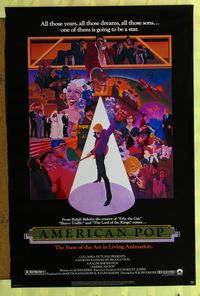
AMERICAN POP
US, 1981, 97 minutes.
Directed by Ralph Bakshi.
American Pop is an animated feature by Ralph Bakshi, who came to fame with Fritz the Cat. He has made a number of arresting animated features including Heavy Traffic, Coonskin, Wizards. He is perhaps best known for his adaptation of Tolkien's The Lord of the Rings. Bakshi is in the tradition of American animation but brings vivid drawing and lively action to his animation work. He is able to dramatise very strongly violence and cruelty. He also uses basic live action for his compositions, characters and action. This was evident in Lord of the Rings and is quite clear here.
While Bakshi goes back over the popular music of the 20th century in the United States, he is particularly selective in the music presented as well as the history that it dramatizes. He shows the "typical" show business story of the poor boy coming from tsarist persecution in Eastern Europe, settling in the slums of New York and building his way up through burlesque, mafia. The succeeding generations seem to have some kind of death wish and while they have some genius with music, they are corrupted or corrupt society and music itself. The overall impact of the film is grim and cynical. While it is not average entertainment, it is a particularly striking view of the United States in the 20th. century.
1. The impact of the film? History, American society, music? Entertainment? Interpretation? For what audience was the film made? Significance in America? Outside America?
2. Ralph Bakshi and his themes: American history, violence, violence, music? The black comedy and interpretation of history? The vigour of his animation styles? Shapes, colours, movement? Drawing over live action? Depth? The animation tradition and their influences? His being influenced by the cinema styles of the decades that he represents?
3. The range of styles: the credits, the silent movie, the Cossack persecution and violence, American migration films, New York at the turn of the century, burlesque, the war sequences of World War One, trenches and hospitals, Minsky's and vaudeville in the '20s, wealth and the mafia, the suburban homes of the '40s, World War Two, the suburban life of the '50s, the transition to the beat generation of the '60s, the dropouts and protest of the '70s, the rock superstars of the '80s? The range and differences in colours, shapes, designs?
4. The title and the range of music? The criteria for selection? How representative of the various decades? Illustrating phases and changes in American society? How was the music used? as background for history and interpretation, as a comment, illustrating the times? The times creating the kind of music? The music mirroring the times?
5. The European background, the pogroms, the Cossacks, the Jews and their loyalty to their religion, death and violence, the families escaping? The musical traditions of Europe? Jewish traditions, especially religious music? These traditions being brought to the United States? The transition to New York, the flow of immigrants, altering of names, the strange change in wag of life and culture?
6. New York and the Bowery, burlesque, the no-hopers on the streets, the advertising, Louis and his friend, Zalmie and his work, his skill? Louis hiring him for more work? Zalmie's mother and her work, the vivid sequence of the fire gutting the factory? The ugliness of the new way of life, Zalmie's American origins, determination, winning? Bringing musical culture and inheriting indigenous music?
7. The concerts of World War One? The entertainers and the danger? The attack and Zalmie's losing his voice? Hospitalised? His moving from being successful singer to entrepreneur and businessman?
8. The growing up with Louis? Louis' influence on Zalmie's life? Minsky's and burlesque? The vulgarity of the performances and the audience? Bella and her beauty? The way of life of the '20s? Zalmie's infatuation with Bella, the sex and the sleazy atmosphere, Bella's pregnancy, marriage? Zalmie's contacts? The family? Affluence? The mafia and the deals, the violence in the streets, the ugliness of Bella's death?
9. Benny growing up and his relationship with his father, the transition to the '30s and '40s? The black band and jazz? The generation born in America adapting to American culture? Benny and his wanting to play the piano? The pressure by his father to marry? His reaction, skill? His volunteering to go to the war? The patriotic soldiers of World War Two? His playing 'Lili Marlene' for the German soldier who killed him?
10. The post-war affluence in the United States, how life. suburban materialism? Zalmie in prison and Tony watching him on the television and the giving of evidence? The background of the affluent Italian migrant families and their mafia connections?
11. Tony growing up, part of the beat generation, listening to Jack Kerouac's poetry? Leaving home, stealing the car, on the American road? Kansas and the encounter with the girl? California, North Beach, writing music, the dropouts and atmosphere of San Francisco? Frankie and her group? Illustrating the '60s? The 1970s, Vietnam, university riots? Background of Jim Hendrix, Janis Joplin? Frankie and the overtones of Janis Joplin, moods, singing, reacting against Tony, letting him go, making demands on him for records? Her death?
12. The arrival of Little Pete and Tony's realisation that he was his son? Tony and his drugs. illness? Franklins abandoning him and then making demands? The impact of her death? Return to New York? On the street? Pete hustling drugs for Tony? The pawning of the guitar and vanishing?
13. Pete and his encounter with the drug dealer? His transforming into an adult drug dealer? His talent? Pressure for the audition? Gaining contract, the rock star? A Frankenstein monster of music produced by American culture?
14. The film's point about music as creative, expressive, reflective? This story taking the shape of American music?
15. The view of America in the 20th. century, its decline? Society, individuals? Corruption? Music corrupted by American society?